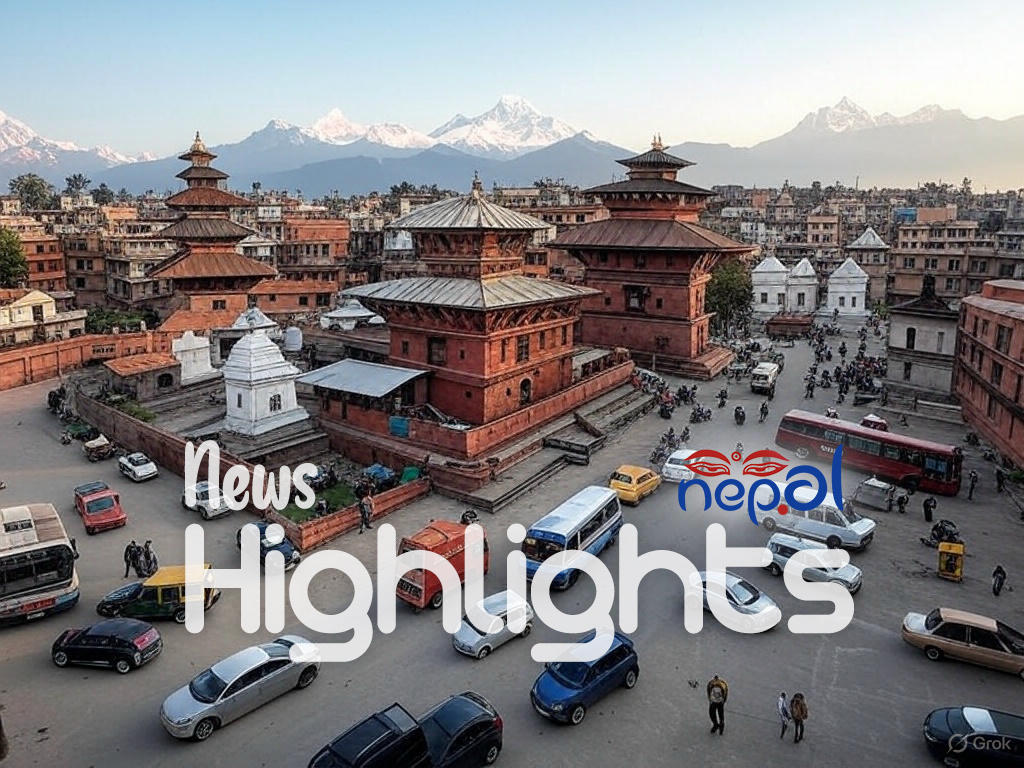Kathmandu, Nepal – Thursday’s national news roundup on May 15, 2025 (Jestha 1, 2082), brought to light significant developments spanning the economy, politics, environment, education, and public health. With volatility in the financial markets, renewed pledges for clean governance, and bold steps toward climate commitments, the country saw a dynamic mix of challenges and forward momentum.
Economy and Finance
The Nepal Stock Exchange (NEPSE) experienced its fifth consecutive day of decline, dropping by 8.41 points to settle at 2,611. While 82 companies registered gains, 164 declined, reflecting cautious investor sentiment amid a reduced trading volume of NPR 7.08 billion, down from NPR 8.73 billion the previous day. The Hotel and Tourism sector surged by 4.91%, buoyed by strong third-quarter earnings, while Development Banks suffered a notable 2.12% decline.
In the precious metals market, hallmark gold dropped sharply by Rs. 3,500 per tola, pricing it at Rs. 181,800. Silver also dipped by Rs. 35 per tola to Rs. 1,925.
On the fuel front, Nepal Oil Corporation (NOC) announced a price cut effective midnight—petrol reduced by NPR 1 per litre, and diesel and kerosene each by NPR 3.
The Auditor General’s 62nd Annual Report flagged major concerns, including NPR 8.65 billion in unpaid telecom revenue, irregular staff appointments at the SEZ Authority, and tax exemption misuse in merged firms. Despite overarching irregularities, Mahabharat Rural Municipality in Kavrepalanchok was lauded for achieving zero irregularities through stringent compliance and team commitment.
In infrastructure and energy, a Rs. 15.19 billion investment agreement was signed for the 90 MW Marsyangdi Semi-Reservoir Hydropower Project. Additionally, JICA agreed in principle to provide a 2.8 billion Yen (approx. NPR 2.59 billion) grant to repair a damaged section of the BP Highway. LIC Nepal declared a 10.526% dividend for shareholders, while Garima Development Bank expanded its outreach in Syangja.
Politics and Governance
Prime Minister KP Sharma Oli vowed to ensure the Nepal Rastra Bank governorship is merit-based, distancing from political favoritism. He also announced a planned power transition to Nepali Congress leader Sher Bahadur Deuba after 14 months.
A major corruption case was filed against Congress lawmaker and ex-minister Mohan Bahadur Basnet and 15 others, seeking over NPR 3.21 billion in penalties for alleged irregularities in the TERAMOX system procurement. Basnet has since been suspended.
The Revenue Advisory Committee proposed broader digital and real estate taxation measures, while SEBON sought clarification from IPPAN on allegations of commission demands for IPO approvals—accusations IPPAN’s leadership downplayed as resolved.
Minister Prakash Man Singh stressed that no further extension for the Parliament Building construction would be granted without a concrete completion plan.
Meanwhile, Gandaki Province prepared its budget amid political friction, and the new Arya Hotel & Spa opened in Thamel, showcasing Nepali heritage through investment by NRN Krishna Simkhada.
Additional highlights included the dismissal of KMC spokesperson Manandhar, the Supreme Court’s June 11 verdict date on a key appointment case, and the arrival of India’s Forest Minister for the Sagarmatha Sambaad.
Health Sector
Health Minister Pradeep Paudel emphasized the growing mental health crisis, urging collaborative efforts and curriculum integration of psychosocial education. The proposed ‘School Health Ambassador Program’ aims to raise student awareness.
However, Jaleshwor Provincial Hospital in Madhesh faced critical shortages in free medicine supplies, severely affecting its daily care for over 300 patients. Despite repeated appeals, emergency services remain strained.
Environment and Climate
The Cabinet approved the third draft of Nepal’s Nationally Determined Contribution (NDC), reinforcing the country’s dedication to the Paris Agreement ahead of the Sagarmatha Sambaad. Goals include net-zero emissions by 2045 and aggressive targets for renewable energy, electric vehicles, and resilient urban development by 2030 and 2035.
Agriculture Minister Ramnath Adhikari acknowledged Nepal’s high disaster vulnerability and stressed the need for regional cooperation and early warning systems to mitigate damage.
Education Reform
A parliamentary sub-committee progressed with clause-wise discussions on the School Education Bill 2080, receiving a 10-day extension to finalize its report. Key agreements include:
-
Converting private schools into trusts within a transition period.
-
Promoting relief teachers through internal competition.
-
Incorporating ECD classes under schools.
-
Phasing out the SEE exam.
-
Assigning head teacher selection to provincial commissions.
This comes after the Nepal Teachers Federation’s protest was suspended, with the bill targeted for passage by mid-June.
Crime and Security
In Dhanusha, seven individuals were arrested for conducting online fraud through social media, deceiving victims via fake offers and misusing digital wallets and bank accounts. Police revealed over NPR 2.63 crore had been transacted through 187 fraudulent accounts.
Separately, Armed Police Force DIG Krishna Dhakal launched a campaign in Madhesh Province to reinforce discipline and crime control, particularly in border zones.
As Nepal navigates a shifting landscape of economic challenges, institutional scrutiny, and reform ambitions, today’s developments underscore a nation striving to balance integrity, growth, and resilience.




